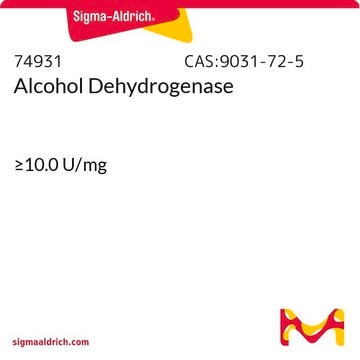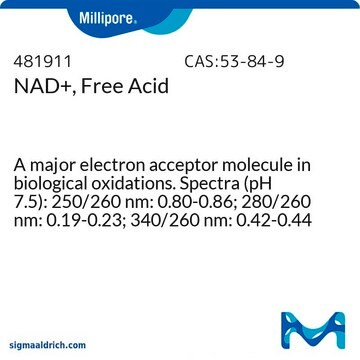N7160
NAD-ADH Reagent Multiple Test Vial
for alcohol determination
Sinónimos:
Ethanol assay reagent
Iniciar sesiónpara Ver la Fijación de precios por contrato y de la organización
About This Item
Código UNSPSC:
41106305
NACRES:
NA.51
Productos recomendados
Aplicación
NAD-ADH Reagent Multiple Test Vial has been used to determine the alcohol content in blood. It has also been used to detect ethanol levels in mice.
Acciones bioquímicas o fisiológicas
Alcohol dehydrogenase (ADH) catalyzes the oxidation of alcohol to acetaldehyde with the simultaneous reduction of nicotinamide adenine dinucleotide (NAD) to NADH. The consequent increase in absorbance at 340 nm is directly proportional to alcohol concentration in the sample.
Otras notas
Vial contains ≥10 μmol of nicotinamide adenine dinucleotide (NAD) and ≥800 units of yeast alchohol dehydrogenase (ADH), buffer salts, and stabilizers.
Palabra de señalización
Danger
Frases de peligro
Consejos de prudencia
Clasificaciones de peligro
Resp. Sens. 1
Código de clase de almacenamiento
11 - Combustible Solids
Clase de riesgo para el agua (WGK)
WGK 3
Punto de inflamabilidad (°F)
Not applicable
Punto de inflamabilidad (°C)
Not applicable
Equipo de protección personal
Eyeshields, Gloves, type N95 (US)
Certificados de análisis (COA)
Busque Certificados de análisis (COA) introduciendo el número de lote del producto. Los números de lote se encuentran en la etiqueta del producto después de las palabras «Lot» o «Batch»
¿Ya tiene este producto?
Encuentre la documentación para los productos que ha comprado recientemente en la Biblioteca de documentos.
Los clientes también vieron
Ajay C Donepudi et al.
Hepatology communications, 2(1), 99-112 (2018-02-07)
Alcoholic fatty liver disease (AFLD) is a major risk factor for cirrhosis-associated liver diseases. Studies demonstrate that alcohol increases serum bile acids in humans and rodents. AFLD has been linked to cholestasis, although the physiologic relevance of increased bile acids
Tatsuro Kumada et al.
The Journal of neuroscience : the official journal of the Society for Neuroscience, 26(3), 742-756 (2006-01-20)
The brains of fetal alcohol syndrome patients exhibit impaired neuronal migration, but little is known about the mechanisms underlying this abnormality. Here we show that Ca2+ signaling and cyclic nucleotide signaling are the central targets of alcohol action in neuronal
Ana M Romero et al.
Neurotoxicity research, 29(1), 69-79 (2015-08-13)
Chronic alcohol consumption may cause neurodevelopmental and neurodegenerative disorders. Alcohol neurotoxicity is associated with the production of acetaldehyde and reactive oxygen species that induce oxidative DNA damage. However, the molecular mechanisms by which ethanol disturbs the DNA damage response (DDR)
Denys V Volgin
Neuroscience letters, 439(2), 182-186 (2008-06-03)
Prenatal alcohol exposure (AE) is associated with lasting abnormalities of sleep and motor development, but the underlying mechanisms are unknown. We hypothesized that AE alters development of GABAergic signaling in the hypothalamic regions important for the control of sleep and
A rapid enzymatic method for estimating ethanol in body fluids.
D Jones et al.
Clinical chemistry, 16(5), 402-407 (1970-05-01)
Nuestro equipo de científicos tiene experiencia en todas las áreas de investigación: Ciencias de la vida, Ciencia de los materiales, Síntesis química, Cromatografía, Analítica y muchas otras.
Póngase en contacto con el Servicio técnico








